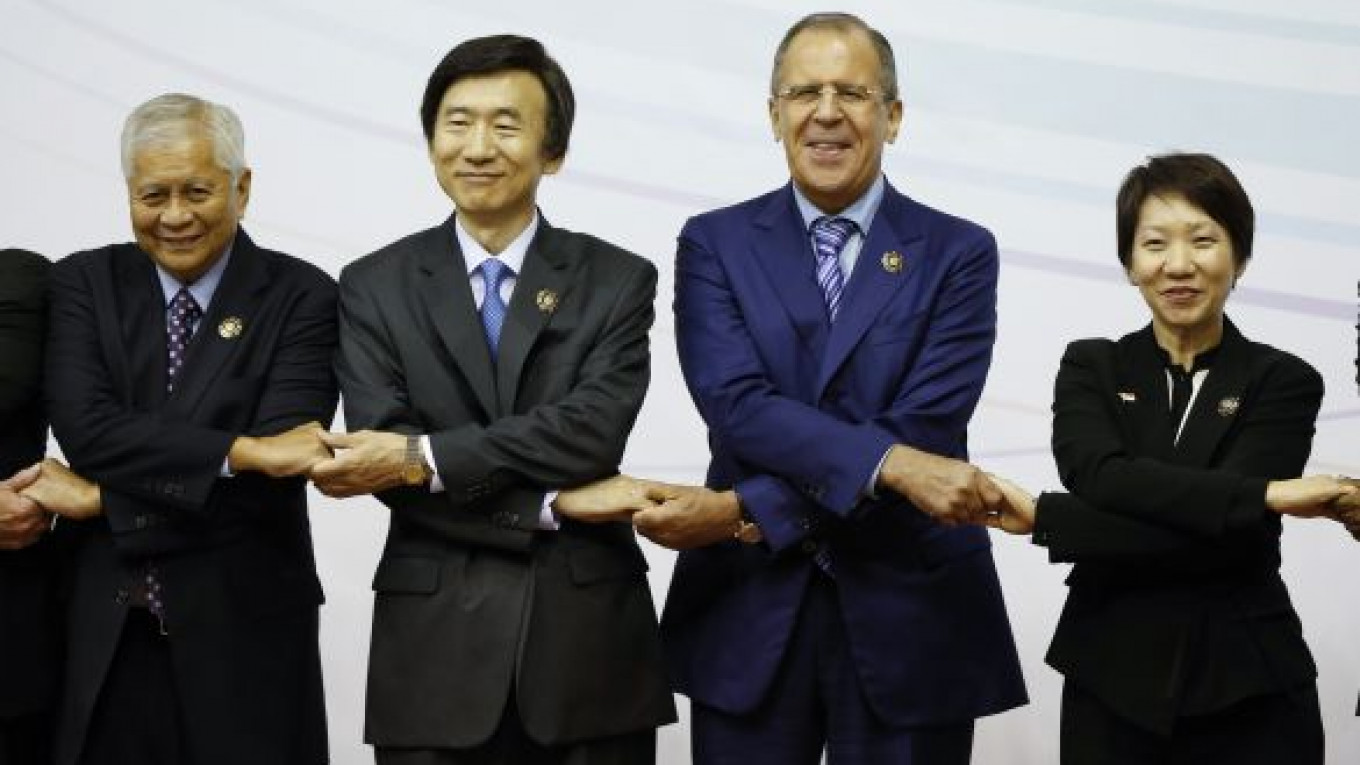BANDAR SERI BEGAWAN — U.S. Secretary of State John Kerry said Tuesday that both the U.S. and Russia are seriously committed to having an international conference on Syria and setting up a transitional government to end the bloodshed and "save the state of Syria."
"There are still things that have to be worked out over the course of these next days, but Foreign Minister [Sergei] Lavrov and I felt that this meeting was a very useful meeting, it was constructive and productive," Kerry told reporters in Brunei, where he was attending an Asian regional security summit.
Kerry said the two countries both believed the meeting should take place sooner rather than later, but acknowledged that it might not be possible until August or later. Such an international meeting, which has been delayed several times before, is known as "Geneva II" because it follows a Syria meeting in the Swiss city in June last year.
Kerry spoke outside the U.S. Embassy in Brunei after a 90-minute-plus meeting with Lavrov on the sidelines of the security summit.
Russia has been a key backer of Syrian President Bashar Assad's regime in the two-year civil war that has claimed more than 93,000 lives, while the Obama administration decided last month to supply military aid to the rebels fighting Assad. Kerry has been on a whirlwind tour of Arab-speaking nations to try to coordinate aid to the rebels.
But Kerry said the U.S. and Russia agreed that they had an ability to make a difference if they could pull together.
"Our objective remains the same — to recognize the notion that there really isn't a military victory, per se, for Syria that keeps Syria as a country," Kerry said. "And No. 2, that we have an obligation to try to work towards a peaceful resolution because a peaceful settlement is the best way to save the state of Syria and to minimize destruction."
He emphasized that the first international conference called for a transitional government for Syria "with a neutral environment by mutual consent to a full transfer of power."
Last month, Lavrov said the U.S. was sending conflicting signals to the rebels. While the U.S. said it favored a peace conference in Geneva, Lavrov said, talk about a possible no-fly zone encouraged the opposition to step up fighting instead of sitting down for talks.
"The message the opposition is getting: Guys, don't go to Geneva, don't say you are going to negotiate with the regime, soon things will change in your favor," Lavrov said then.
On Tuesday, Lavrov declined to sum up his meeting with Kerry, telling reporters only that their discussion was "excellent."
The United States, like the Syrian rebels, says Assad and his family should play no role in a transitional government. Russia says there should be no conditions on the talks.
Washington has opposed including Iran in the talks amid continuing disagreement about its disputed nuclear program.
While the United States and its European and Arab allies are seeking to convince rebels to attend the conference, Russia's role is to bring government officials to the table.
Kerry said that both he and Lavrov were "more than serious" and committed to the Geneva process. "We both agreed that our countries will … be able to pull together in that effort," Kerry said.
Syria was also the focus of Kerry's discussion with Turkish Foreign Minister Ahmet Davutoglu. A senior State Department official said the two discussed ways to strengthen support to the opposition and step up plans for an international conference to resolve the crisis.
The official, who spoke on condition of anonymity to disclose details of the closed-door meeting, said Kerry and his Turkish counterpart also discussed how to expand the Syrian people's access to humanitarian aid. He said both men expressed concern over recent Assad regime attacks on civilians in the central province of Homs and the influx of fighters from the Lebanese militia Hezbollah.
Kerry said he spoke briefly with Lavrov about National Security Agency leaker Edward Snowden, an issue that has strained relations between the two nations.
Itar-Tass reported that the two did not discuss Snowden, but Kerry said he raised U.S. concerns and hoped Lavrov would pass them to Russian officials.
Before the meeting, when a reporter asked whether he and Kerry would talk about asylum for Snowden, Lavrov scolded the reporter, saying, "Don't shout at me, please."
Irritated by reporters who chased him down the hall after the meeting, Lavrov said, "I am on my way because I missed my lunch" and "You are absolutely crazy. I don't know how you can work like this."
Material from Reuters is included in this report.
Related articles:
A Message from The Moscow Times:
Dear readers,
We are facing unprecedented challenges. Russia's Prosecutor General's Office has designated The Moscow Times as an "undesirable" organization, criminalizing our work and putting our staff at risk of prosecution. This follows our earlier unjust labeling as a "foreign agent."
These actions are direct attempts to silence independent journalism in Russia. The authorities claim our work "discredits the decisions of the Russian leadership." We see things differently: we strive to provide accurate, unbiased reporting on Russia.
We, the journalists of The Moscow Times, refuse to be silenced. But to continue our work, we need your help.
Your support, no matter how small, makes a world of difference. If you can, please support us monthly starting from just $2. It's quick to set up, and every contribution makes a significant impact.
By supporting The Moscow Times, you're defending open, independent journalism in the face of repression. Thank you for standing with us.
Remind me later.






